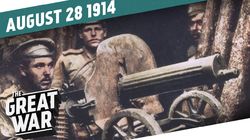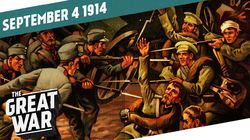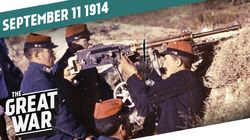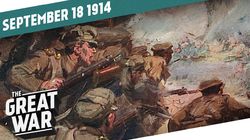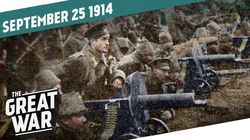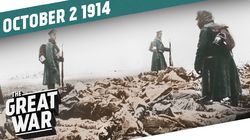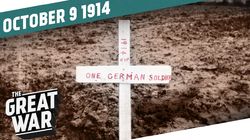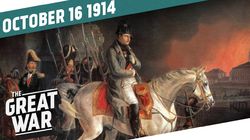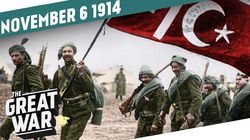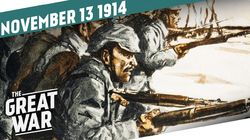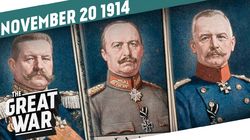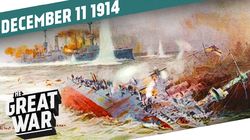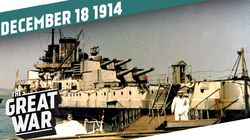Episodes
Episode: 1x01 | Airdate: Jul 28, 2014 (8 min)
After the assassination of Franz Ferdinand, Austria-Hungary is determined to put a lid on Serbia once and for all. Germany wanted to go to war with Russia sooner than later, because it was a afraid of a strong Tsar Nicholas II. In our first episode, Indy explains how the various European conflicts spiralled into a world war. This is the first episode of our ongoing series where we follow the events of World War 1 week by week 100 years later.
Episode: S01 Special | Airdate: Jul 31, 2014 (10 min)
To understand World War One completely, you need to understand what happened before. In 1914, Europe was on the verge of modernity. The German Reich, France, Great Britain and Austria-Hungary were fighting over influence and colonies. Russia was gaining more and more power while the Ottoman Empire was only a shadow of its former self. Meanwhile, smaller nations were striving towards independence to fulfil their dream of being an sovereign state. In our first special episode about the prelude to World War 1, Indy explains what Europe was like in 1914.
Episode: S01 Special | Airdate: Aug 1, 2014 (8 min)
After multiple wars, the Balkan states had gained independence from the Ottoman Empire. At the same time, Austria-Hungary increased its influence over the region. The second video in our special series about the prelude to World War 1 is focusing on South-Eastern Europe and the Balkans. Indy explains the rising conflict between the double monarchy and Serbia. Even before 1914, the Balkan Wars lead to unbelievable misery in the area and would have a huge influence later on. This video is part two of three special episodes dealing with the prelude to war.
Episode: S01 Special | Airdate: Aug 4, 2014 (8 min)
On June 28th, 1914, Franz Ferdinand, the heir to the Austro-Hungarian throne, was assassinated by Gavrilo Princip, a nationalist working for the Serbian underground organisation "Black Hand" (officially known as "Unification or Death"). From today's perspective, the assassination is seen as the event that triggered the chain reaction leading to the outbreak of the Great War. These events are known today as the July Crisis. Only one month after the shot, on July 28th, Austria-Hungary declared war on Serbia.
Episode: 1x02 | Airdate: Aug 7, 2014 (10 min)
Austria-Hungary starts the bombardment of Belgrade. What follows is a deployment race of armies between all major powers in Europe. Nobody wants to be unprepared in case of an attack. Germany is implementing the Schlieffen-Plan. The idea is to avoid a two front war by conquering Paris via Belgium. After that the full attention would be diverted to Russia. One thing gets clear in the first days at the Western Front: This war is going to be different - this was modern warfare.
Episode: 1x03 | Airdate: Aug 14, 2014 (8 min)
The first few days of war were a combination of failed organisation and chaos. The Austro-Hungarian supreme command lacks combat experience, and their irrational actions in Serbia are causing turmoil among the Germans. At the Eastern and Western Front, early signs of problems can be seen, too, which the armies will pay a terrible price for, in the upcoming weeks.
Episode: 1x04 | Airdate: Aug 21, 2014 (10 min)
In the early days of World War 1, warfare is still based on ideas and ideals of 19th century generals. The technological progress during industrialisation clashes with obsolete war tactics (Plan XVII). Tens of thousands of soldiers lose their lives in carnage at the Western Front. The French Army marches into battle in bright uniforms, where the German Army awaits them with machine guns. Artillery already shows how brutal and effective it's going to be during the rest of World War 1.
Episode: 1x05 | Airdate: Aug 28, 2014 (10 min)
During their advance through Belgium, the German Army is committing atrocities against Belgian civilians - justified as response to resistance and sabotage against their advancement. The Austro-Hungarian Army is perpetrating massacres against the Serbian civilian population to retaliate against Serbian guerrilla warfare. At the Eastern Front, German generals Hindenburg and Ludendorff succeed in one of the most important battles of World War I: The Battle of Tannenberg.
Episode: 1x06 | Airdate: Sep 4, 2014 (10 min)
While the Germans on the Western Front are very close to reaching Paris, the Eastern Front proves to become a disastrous failure for the Austro-Hungarian forces. Conrad von Hötzendorf overestimated his skills and the strength of his troops. And after his too complicated plan in Galicia failed, the town of Lemberg falls into the hands of the Russians. Meanwhile, the war starts spreading into Asia, as Japan is besieging Tsingtao and New Zealand conquers German Samoa.
Episode: 1x07 | Airdate: Sep 11, 2014 (10 min)
The German Army is so close to Paris that French soldiers are brought to the front by taxis. Together with the British Expeditionary Forces, the French are fighting the German advance near the Marne river. Meanwhile, the Austro-Hungarian army is retreating to the Carpathian Mountains after a catastrophic defeat against Russia with hundreds of thousands of casualties.
Episode: 1x08 | Airdate: Sep 18, 2014 (8 min)
After the advances and retreats during the early weeks of war, the front is coming to a grinding hold after the Battle of the Aisne. The German Army is digging itself in on one side of the river and a new, horrible chapter of World War One begins: trench warfare. To be prepared for this new kind of war, the British Army is recruiting over 400.000 soldiers still believing that the war will be over by Christmas.
Episode: 1x09 | Airdate: Sep 25, 2014 (10 min)
Sparked by the desperate state of the Austrians, the Russian army goes on the offensive. General Ivanov even tries to use his numerical superiority to make up for the German victories a few weeks ago. Meanwhile, the armies of the Western Front try to outflank each other as they race north to the sea. And in the North Sea itself, submarine warfare really gets going while in the air, we see airplanes used in large military operations for the first time in history.
Episode: 1x10 | Airdate: Oct 2, 2014 (10 min)
The autumn rain turns the battlefields into muddy landscapes. Mud in which the soldiers are hardly able to dig trenches and in which no artillery gun will stand. The first change of seasons is proving to be a big new challenge for the armies in Europe. While at the time, the longest siege of the war is starting, we can also see the first major African battles of World War 1.
Episode: 1x11 | Airdate: Oct 9, 2014 (10 min)
In the trenches on the Western Front and in the mud on the Eastern Front, hundreds of thousands of soldiers die and with them dies the illusion of a short war. After heavy casualties, the armies are adapting to a longer conflict and are looking for new recruits. To convince them to fight they are taking advantage of national minorities and their hope of equal rights and self-determination.
Episode: 1x12 | Airdate: Oct 16, 2014 (9 min)
After defeating the Russian Army in the early weeks of the war, the German and Austrian generals hope to push the Russians back with combined forces. But, like Napoleon 100 years earlier, they underestimate their enemy and his tactics and so the tides are turning on the Eastern Front. On the Western Front, the last frontline gaps are closed and the British army is entering a small town called Ypres, which will eventually be the symbol for the carnage in Flanders for the next four years.
Episode: 1x13 | Airdate: Oct 23, 2014 (9 min)
The first weeks of war already took hundreds of thousands of lives and the daily struggle to survive in the trenches on the Western Front has nothing to do with the promised glory. Back home, propaganda is already working and grotesquely distorting the public's opinion about the war. While the British civilians feared a German invasion, some of the leading German scientists and intellectuals published the "Manifesto Of The 93" in which they rallied for solidarity with the Germans.
Episode: 1x14 | Airdate: Oct 30, 2014 (10 min)
After some heavy casualties during the first months of war, the armies had to look for new recruits. While Great Britain undertook soldiers in military service to fill up their ranks, Germany was relying on reservists and inexperienced recruits. This fatal German mix was sent against smaller, but much more experienced British and French troops. The resulting carnage had no military effect, but was later on idolized by the German propaganda and is today known as the "Kindermord" (child murder) or Massacre of the Innocent.
Episode: 1x15 | Airdate: Nov 6, 2014 (10 min)
Three months after the outbreak of the war, another world power enters the conflict: The Ottoman Empire. The Ottoman war minister Enver Pascha, a supporter of a new Turkish self confidence, wants to gain advantages for a future Turkey by declaring war. Meanwhile, another ship of the German East Asian Squadron is surprising the Royal Navy by sinking two of their ships near Coronel, Chile. Regardless, the battles on the Eastern Front, Western Front and in Serbia are continuing.
Episode: 1x16 | Airdate: Nov 13, 2014 (9 min)
The German army dug in at the Western Front and waited for the next Russian attack at the Eastern Front. Even though the Germans outnumbered their opponents, they barely stood a chance against machine guns in No Man's Land. They realize: to defend a position is a lot easier than to attack and conquer. Especially while fighting near Ypres. At the Eastern Front, things are going better for Chief of Staff Ludendorff: he breaks through outstretched Siberian lines. At the same time, Russian soldiers are faced with a new enemy and start the Bergmann Offensive in today's East-Turkey.
Episode: 1x17 | Airdate: Nov 20, 2014 (9 min)
The commanders of the German army blame each other for the missing victories. Erich von Falkenhayn and Paul von Hindenburg both believe that they have the only solution to the problem. The German emperor Wilhelm II feels more and more excluded when it comes to military decisions. His soldiers become pieces on a chessboard and the war of the 20th century also takes its toll on some of the best commanders of World War 1. The situation at the Western Front stays unaltered: the French and Germans fight each other between the trenches. On the contrary, at the Eastern Front the Russians and the Germans are battling in a heavy fight.
Episode: S01 Special | Airdate: Nov 24, 2014 (12 min)
The prevalent conduct of war on the Western Front of the First World War is unmistakably trench warfare. The trenches with knee deep mud are a war theatre as well as home to the soldiers. But how does it look like inside a trench? How is it constructed? Indy took a look and explains why and how the trenches could be the base for a war between 1914 and 1918 and how life was inside a trench.
Episode: 1x18 | Airdate: Nov 27, 2014 (9 min)
Four months after the outbreak of the war, a new objective develops: the fight for the most valuable resources. The modern warfare and its war machines need one thing more than anything: Oil, iron, steel or cole can be a matter of life and death. The British advance into the Ottoman Empire and conquer the city Basra. Their goal is to secure their drilling facilities at the Arab Gulf. Meanwhile, the situation at the front is gridlocked, especially in the trenches on the Western Front.
Episode: 1x19 | Airdate: Dec 4, 2014 (10 min)
During the first week of December, Austria manages to capture Belgrade. Thereby Austria is the first nation to achieve one of its war aims. The victorious Austrians are joyful, but the Serbs strike back and the Austrian euphoria takes a sudden end. Meanwhile, the Russians fight against the German and Austrian troops in front of Cracow. But the Austrians are able to stop the Russian offensive and achieve yet another victory.
Episode: 1x20 | Airdate: Dec 11, 2014 (10 min)
Near the far away Falkland Islands the story of the German East Asia Squadron is coming to an end: in a naval battle nearly the entire squadron is sunk and Maximilian von Spee dies together with over 2000 German seamen. Meanwhile, the war of attrition is still going on in Europe and Austria-Hungary has to learn that their conquest of Belgrade is not putting a lid on the Serbian resistance.
Episode: 1x21 | Airdate: Dec 18, 2014 (10 min)
German admiral Franz von Hipper reluctantly carries out his orders to bomb British costal towns. And indeed, this attempt to intimidate British civilians only unites them. British propaganda gets another opportunity to portray Germans as bloodthirsty and brutal. Meanwhile, the French start a new offensive near Vimy on the Western Front.
Episode: S01 Special | Airdate: Dec 24, 2014 (9 min)
Initially, everyone believed that this war would be over by Christmas, but on Christmas Eve 1914, soldiers were still facing each other in France, Belgium, throughout Eastern Europe, and all of the other theatres of war. But instead of shooting at each other, quite a few soldiers decided to sing and celebrate this night with their enemies. This happened in many places on the Western Front, and the commanding officers were not happy about it. In future, they would see to it that it did not happen again.
Episode: 1x22 | Airdate: Dec 25, 2014 (10 min)
Right before Christmas the allied powers begin the Champagne offensive, which will last several months. In snow, mud,and under horrible living conditions not only the soldiers suffer. The images of a war fought with honour and glory are finally over as even the white flag is used for ambushes now. Far away in the mountains of the Caucasus, Russia and the Ottoman Empire are fighting a grim battle, too, in which many soldiers die during interminable marches in the snow wearing summer uniforms.










